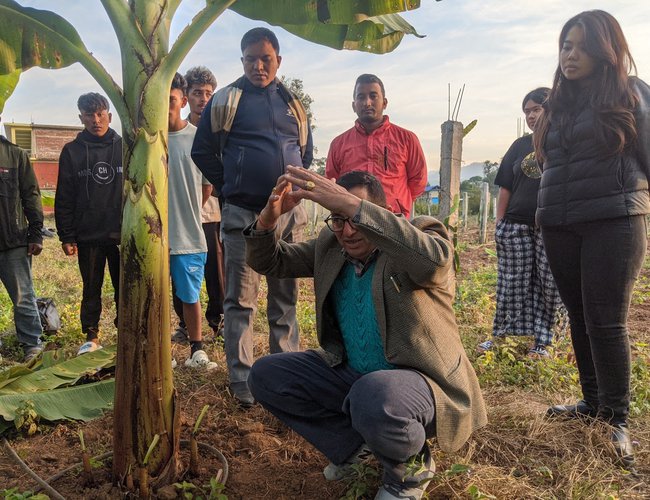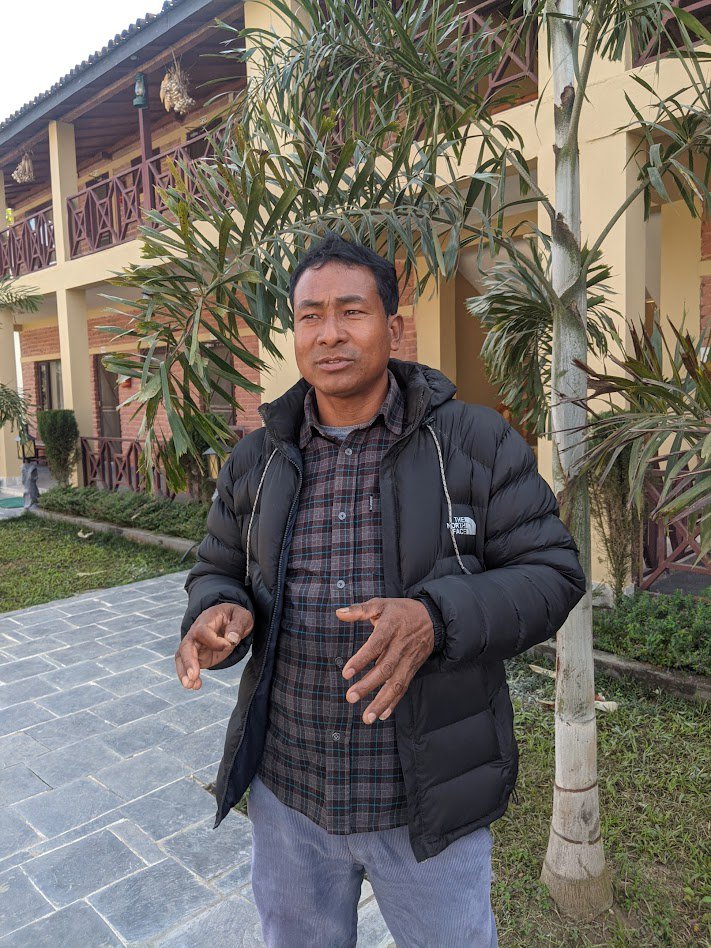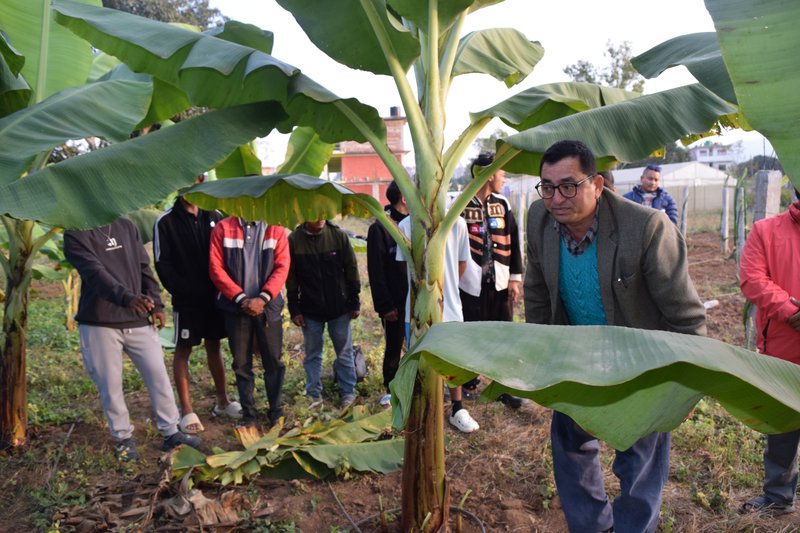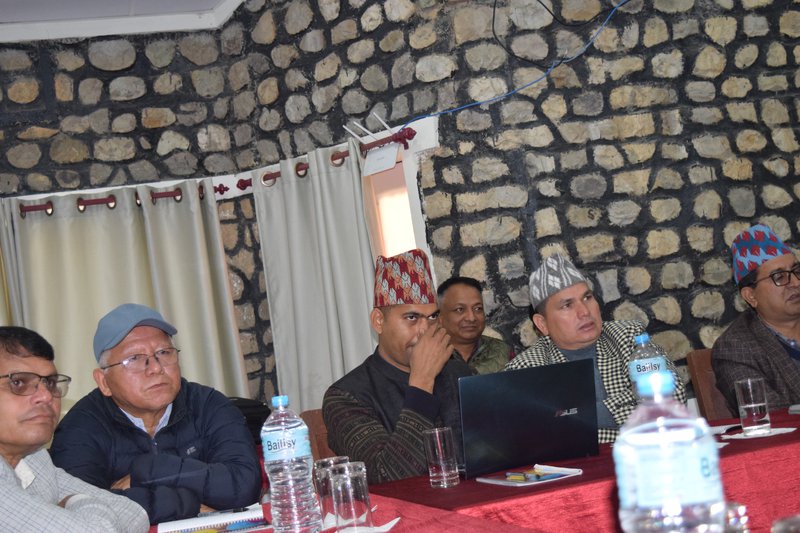
Surendra Chaudhary, 38, suffered from starvation while cultivating crops such as rice, wheat, maize, and lentils for food. However, he transformed his own lifestyle and the lives of several poor and marginalized farmers by cultivating bananas.

After almost a decade of hard work, Chaudhary became a prominent banana farmer and revolutionized farming techniques in the Sudur Paschim Province.
Surendra Chaudhary was one of the first farmers selected by Helvetas Nepal's Elam Project, the precursor to InElam, to cultivate bananas.
He never had a chance to get a fairly paid job in Nepal. With the idea of making paper from banana trees, he launched his own business. Today, he creates jobs for disadvantaged Nepalese.
Chaudhary's story is inspiring, and sometimes it feels like a fairy tale to him. Unfortunately, his father was once evicted from his own property. Surendra's parents built a new life on a patch of land where they found refuge, which was a third of an acre. However, as the son of a day laborer, he couldn't attend school, and as a teenager, he sustained himself with odd jobs.
The little money he earned was insufficient to make his dream of owning a banana farm a reality. Fortunately, he learned about Elam, a project that supports good business ideas. He contacted Helvetas and completed a 35-day course on sustainable banana cultivation over three years. The course covered marketing, accounting, creating a business plan, and learning about banana diseases and pesticides. His business idea was to sell bananas and use the stalks to make paper. Surendra Chaudhary, 38, suffered from starvation while cultivating crops such as rice, wheat, maize, and lentils for food. However, he transformed his own lifestyle and the lives of several poor and marginalized farmers by cultivating bananas.
After nearly a decade of hard work, Surendra Chaudhary became a prominent banana farmer and revolutionized farming techniques in the Sudur Paschim Province.
Chaudhary was one of the first farmers selected by Helvetas Nepal's Elam Project, the precursor to InElam, to cultivate bananas.
He never had the opportunity to secure a fairly paid job in Nepal. With the idea of making paper from banana trees, he launched his own business. Today, he creates jobs for disadvantaged Nepalese.
Chaudhary's story is inspiring. However, it sometimes feels like a fairy tale to him. Unfortunately, his father was once evicted from his own property. Surendra's parents built a new life on a patch of land where they found refuge, which was a third of an acre. As the son of a day laborer, he couldn't attend school, and as a teenager, he sustained himself with odd jobs.
The little money he earned was insufficient to make his dream of owning a banana farm a reality. Fortunately, Surendra discovered Elam, a project that supports promising business ideas. He contacted Helvetas and completed a 35-day course on sustainable banana cultivation over three years. The course covered marketing, accounting, business plan creation, and banana disease and pesticide management. His business plan was to sell bananas and use the stalks to produce paper.
"Elam changed my life," says Surendra, who is now 44. After spending a month experimenting with banana paper, Surendra became Nepal's first banana paper producer. Now, almost 15 years later, he owns about ten hectares of land and specializes in cultivating banana seedlings, which bring in more profit than banana paper.

He oversees a team of 29 employees and has constructed a state-of-the-art nursery that produces an abundance of seedlings. Additionally, he has built a concrete house.
In this residence, his wife has set up a tailoring business. Surendra, breaking through familial barriers, was the first to send his son to college, where he pursued a degree in electrical engineering. From once being a disregarded day laborer, Surendra has risen to become the esteemed president of his district's association of banana producers.
"The banana means everything to me," he expresses. "It is akin to a deity. Truly, without the banana, I would be nothing." Reflecting on our achievements and current prosperity, it is clear that my life has taken a stark departure from the poverty of my past. It feels as though my life began anew with the initiation of Helvetas' project.
Annually, Nepal faces a deficit of half a million jobs. Helvetas recognizes this challenge and empowers socially disadvantaged young individuals to start small businesses. Through this process, individuals acquire skills in creating business plans, managing accounts, and reinvesting profits. The establishment of many small businesses contributes to job creation within their own country.
Helvetas Nepal's InElam Project has had a significant impact on the expansion of entrepreneurs and enterprises in Karnali, Madhesh, Sudur Paschim, and Lumbini Provinces.
Our Business Expansion Orientation program is designed to assist micro-enterprises that are already in operation and have the potential for expansion. The program aims to enhance the business skills of micro-entrepreneurs and provide support for planned enterprise growth. We offer a comprehensive Business Plan for Growth, addressing key areas such as market and marketing strategies, selling skills, and facilitating credit linkage.

Surendra Chaudhary's inspiring journey is a testament to the transformative power of entrepreneurship. He faced challenges in securing a well-paying job in Nepal, so he took the initiative to start his own business. His venture involved making paper from banana trees, providing employment opportunities for disadvantaged Nepalese.
Surendra's success can be attributed to his participation in the Elam project, which supported innovative business ideas. Through Helvetas, he underwent a comprehensive 35-day course over three years, covering sustainable banana cultivation, marketing, accounting, business plan creation, and knowledge about banana diseases and pesticides.
Over the years, Surendra expanded his enterprise, currently owning about ten hectares of land and specializing in banana seedlings, which proved to be more profitable than banana paper.
"Elam changed my life," reflects Surendra, highlighting the transformative impact of entrepreneurship training and support. His success story underscores the potential for positive change when individuals with determination and innovative ideas receive the right guidance and support.
Helvetas Nepal has also connected its entrepreneurship program with youth like Top Lal BK from Bardia Municipality in Lumbini Province. After facing severe situations abroad, including in Europe and the Gulf, Top Lal BK started banana farming on a small scale with the help of learning and support from Chaudhary. Now, he is a leading banana producer, cultivating bananas on over 32 Bighas (four acres) of rented land. Top Lal BK stated, 'My annual turnover is around Rs. 10 million. This is a significant amount of money that I could not make anywhere else in the world.'
Surendra Chaudhary pioneered banana farming in Kanchanpur district of Sudur Paschim. However, his student BK is now the biggest banana farmer in the region. Chaudhary said, 'If there is support from organizations like Helvetas, nothing is impossible.' He started banana farming a decade ago, and now sells bananas worth Rs. 7 million annually.
Ten years ago, with the support of Helvetas Nepal's Elam project, Chaudhary became a successful banana farmer and entrepreneur in Sudur Paschim Province.
Thanks to the efforts of Chaudhary and other young entrepreneurs, with the support of Helvetas Nepal, Kanchanpur and Kailali in Sudur Paschim Province are now hubs for banana farming. Chaudhary is credited with turning Sudur Paschim Province into a hub for banana farming.

Tek Bahadur Singh, from Helvetas Nepal, has contributed greatly to attracting young farmers like Chaudhary and BK to banana farming in Sudur Paschim Province. Helvetas Nepal's InElam Project provides technical and financial support to small and marginalized farmers like Chaudhary for commercial banana farming, and has made a strong impact on the expansion of banana farming in western Nepal.
Chaudhary cultivates bananas on 5 acres of land and also produces and sells banana saplings. He is willing to provide training, counseling, and lobbying services to other banana farmers.
Chaudhary does not consider himself an expert. However, I am always ready to share my knowledge and experiences with farmers whenever they require my services. I have communicated with them over the phone, in person, and in groups, wherever they need me.
For farmers, Chaudhary is like a friend. He does not charge any money if the place is near his residence. If the place is far away, he charges a small amount for transportation.
InElam is collaborating with farmers to develop and expand banana farming. They are supporting farmers through policy, technology, and financial means. Tek Bahadur Singh from Helvetas Nepal stated that they advocate for policy changes to promote Nepali farmers, including those like Chaudhary, a youth farmer. Just a month ago, we visited the Minister of Finance, the head of the Federal Parliamentary Committee, and the Minister of Agriculture and Livestock. We do similar things at the provincial level as well. Helvetas has also been collaborating with farmers on policy initiatives and advocacy.
Youth like Chaudhary from Kanchanpur have become sources of inspiration for those who aspire to be professionals and entrepreneurs. Collaboration between cooperatives, local municipalities, and Helvetas is becoming a model for banana farmer development in Nepal.
Hari Gurung, program manager of InElam Project, stated that their project provides support to banana farmers at the policy, technological, advocacy, and financial levels. Helvetas Nepal's InElam project promotes technological innovation and micro-enterprise to establish micro-entrepreneurship in Nepal.
Helvetas Nepal has successfully brought change to the Sudur Paschim Province, including the banana revolution. The provincial government is grateful for its contributions to generating employment through cash crops like bananas in the region. Joint Secretary Tika Ram Thapa of the Ministry of Agriculture and Cooperative of Sudur Paschim Province said, 'The ministry has been working closely with Helvetas Nepal.' Joint Secretary Tika Ram Thapa of the Ministry of Agriculture and Cooperative of Sudur Paschim Province said, 'The ministry has been working closely with Helvetas Nepal.' Joint Secretary Tika Ram Thapa of the Ministry of Agriculture and Cooperative of Sudur Paschim Province said, 'The ministry has been working closely with Helvetas Nepal.'
Akriti Rana from Helvetas Nepal explained that InElam promotes resource-based enterprises that focus on generating employment by utilizing local resources and creating value chains through a market system development approach. The organization aims to provide employment opportunities to disadvantaged women and men in Nepal through the productive use of local resources, including banana farming.
The project aims to support unemployed and underemployed individuals, with a particular emphasis on disadvantaged groups. This includes exploring markets and conducting sub-sector analyses, testing and developing new products, approaches, and technologies, and piloting implementation through partnerships with the private sector.
“Investing in a small business is a reasonable use of money, especially when the formal sector cannot provide jobs for the growing number of youths. Encouraging youth to become entrepreneurs using local resources is the best option,” said Dr. Prabin Manandhar, country director of Helvetas Nepal. “ Our program has demonstrated that it can replicate to broader scale to make Nepal as net exporter of banana.”
The project facilitates market system development for enterprise growth. The Elam project promotes entrepreneurship among micro entrepreneurs through modular-based business training. These trainings have been developed based on years of experience in micro enterprise development and employment. Training manuals for each module are prepared in Nepali and uploaded to the HELVETAS Nepal website for public use.
Business awareness for start-up new enterprise orientation: Along with helping possible micro entrepreneurs to choose suitable capability, the module also helps them develop entrepreneurship skill. Business Plan for business-start up: will choose among those who have business plan and will support them establish an organized enterprise based on business plan.
.

Keshab Poudel
Poudel is the editor of New Spotlight Magazine.
- FOURTH PROFESSOR Y.N. KHANAL LECTURE: Nepal-China Relations
- Jun 23, 2025
- Colonel JP CROSS: Centenary Birthday
- Jun 23, 2025
- REEEP-GREEN: Empowering Communities with MEP
- Jun 16, 2025
- BEEN: Retrofitted For Green
- May 28, 2025
- GGGI has been promoting green growth in Nepal for a decade: Dr. Malle Fofana
- May 21, 2025















